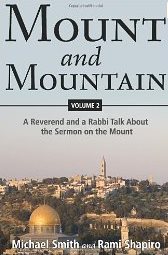By Jeff Brumley
A shared passion for studying and interpreting Scripture helped inspire a Rabbi and Baptist pastor to pen the ongoing “Reverend and the Rabbi” series of books on the Bible.
“I think the first thing is we both share a curiosity about the world in general and religion in particular,” Michael Smith, senior pastor of Central Baptist Church in Knoxville, Tenn., said of his relationship to co-author Rabbi Rami Shapiro. “That kind of binds us together.”
So does Spiderman. Both share a mutual childhood interest in superhero comics. “We were definitely Marvel Comics people,” said Smith, 58. “Spiderman, Thor, the Fantastic Four – all that bunch.”
Those shared interests emerged during a series of meetings in 2004, while Smith was pastor of First Baptist Church in Murfreesboro, Tenn. Smith was moderator for a panel discussion on “The Passion of the Christ” movie. Shapiro, who lives in Murfreesboro, was a panelist. They met to plan the event over lunch at a Mexican restaurant.

That’s when another huge factor in their budding friendship came to light.
“It was then we discovered we both love Mexican food,” said Shapiro, 62, an author and lecturer. “I can only have Mexican food with Mike, because my wife doesn’t like it.”
As the two continued to meet — with conversations ranging from fantasy literature to religion to current events — their mutual respect and admiration grew. One day Shapiro said he shared Smith’s frustration about Christian congregations that hold poorly informed and planned Passover Seders. From that conversation came their frist book, Let Us Break Bread Together: A Passover Haggadah for Christians, in 2005.
Later, Smith approached Shapiro with the idea of examining passages of Scripture from their own religious traditions. He got the idea after reading the collected letters of C.S. Lewis, written in a time when colleagues held in-depth, continuing correspondences.
“I said I wondered if there was a modern way to have that kind of conversation about a biblical text,” Smith said. “So we decided on the Ten Commandments and the Sermon on the Mount, and that a blog was a natural medium.”
The Mount and Mountain blog was launched, and it led to their second book project, Mount and Mountain: A Reverend and a Rabbi Talk about the Ten Commandments, in 2011. The second volume, looking at the Sermon on the Mount, was released in March. Shapiro said the next book will cover Genesis.
Rabbi: ‘open to Jesus’
Shapiro said he and Smith often disagree on an interpretation of text or of what ethical action a given passage calls for. But that’s OK, because Judaism emphasizes the importance of interpreting Scripture from different vantage points – regardless of agreement.

“He’s presenting truth as he sees it for the sole purpose of putting truth on the table, and I’m doing the same thing,” Shapiro said. “Both are considered the words of the living God.”
Shapiro said he benefits spiritually even by hearing viewpoints he doesn’t share. That would include Smith’s belief that Jesus was the Messiah. “He has enriched my understanding of Jesus as a prophet and a teacher and a rabbi,” Shapiro said. “I am open to the wisdom of Jesus, and I think he was a God-intoxicated Hebrew wisdom teacher.”
Smith said he, too, has benefitted from his intellectual and theological wrangling with the rabbi. “The biggest single impact has been to drive home the reality of the Jewishness of Jesus,” Smith said. “It really comes alive that you are dealing with a Jewish person in the first century.”
Smith said it has changed his study of the Gospels and how he prepares his sermons. “Any time I am dealing with Jesus or a saying of Jesus, my first question is ‘What was Jesus thinking and feeling and speaking as a first-century Jew?”
Books ‘a byproduct’
Both men said it would be a mistake to think this is all about forging interfaith partnerships in order to write books. In fact, none of it would be possible without their most important ingredient: friendship.
Shapiro said a genuine friendship – built equally on shared academic, professional and personal interests – provides the safe space needed to explore and debate without subtle efforts to convert or win arguments.
“It’s all about maintaining integrity without blurring the lines between faiths or pretending [differences] don’t exist,” Shapiro said. “Because we are friends we are safe. I never feel I have to defend my position.”
Smith said the restaurants, blog and books have all shown him how important it is to seek and build friendships across religious boundaries. “It’s not a mock friendship,” he said. “It’s not a utilitarian friendship. It’s a real friendship.”
“The books are a byproduct.”
